AMD Unveils Threadripper 3960X and 3970X, Ryzen 9 3950X Details, and Athlon 3000G
AMD has a fleet of new core-heavy battleships coming this month. And a small little APU, too.
Today AMD announced that its belated $749 Ryzen 9 3950X will barrel into the desktop PC market on November 25 with 16-cores and 32-threads for mainstream platforms. The company also dished fine-grained details, like cooling and motherboard requirements, for the new processors.
For heavier users that need more than the 3950X, AMD also revealed its new Threadripper 3000 lineup. The 24-core 48-thread Threadripper 3960X will come to market at $1,399, while the 32-core 64-thread Threadripper 3970X will debut at $1,999. Both come on November 25 and feature impressive base clocks, a 4.5 GHz boost, 72 usable lanes of PCIe Gen 4.0 connectivity, and 140MB/144MB of total cache, respectively.
You'll need a new motherboard with the sTRX4 socket and TRX40 chipset for the new Threadrippers, which we'll cover in-depth on the following page.
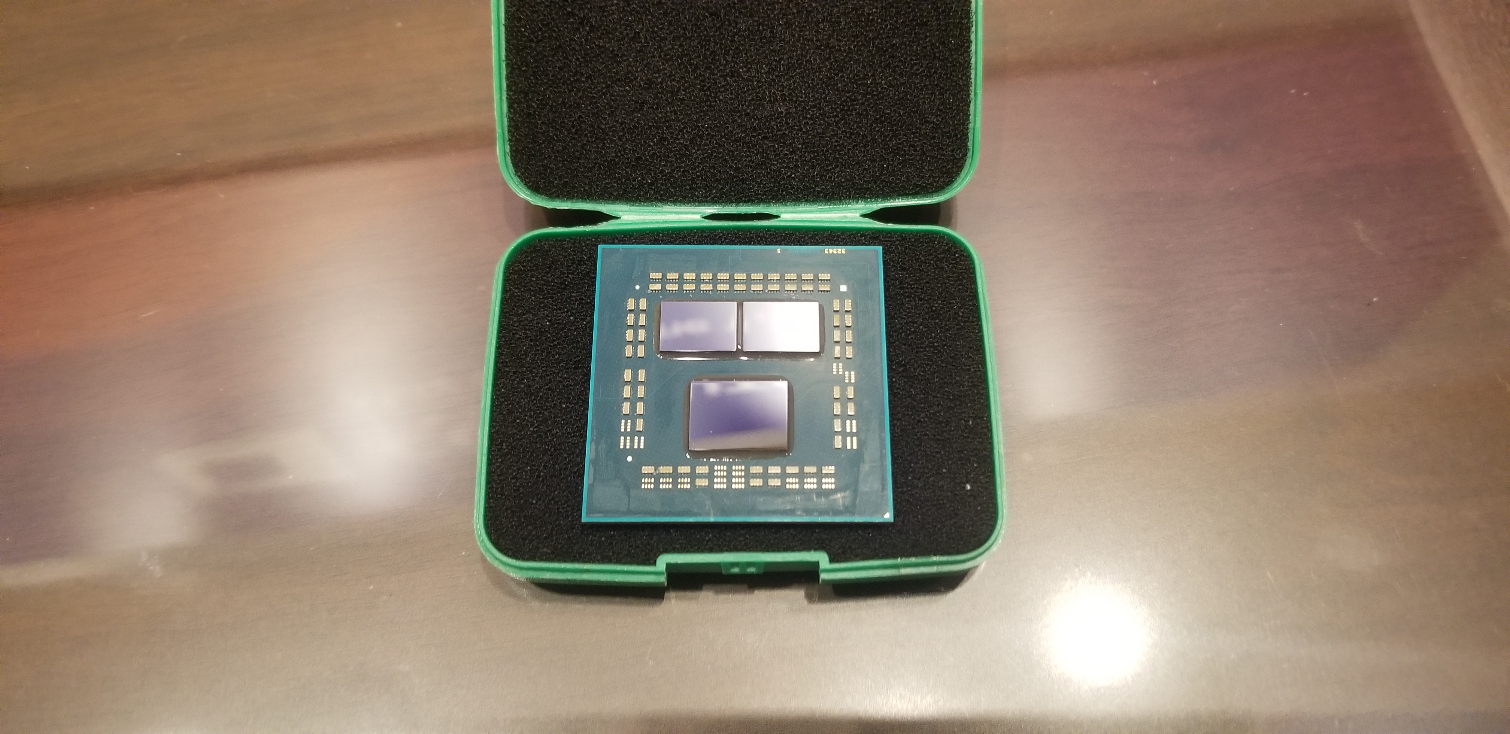
AMD also announced the Athlon 3000G, a new Picasso APU with Radeon Vega graphics paired with the 12nm process and Zen+ architecture for a mere $49. The 3000G comes to market November 19 and is an iterative update to the company's Athlon 200GE. However, AMD officially unlocked overclocking this time around to please the value crowd.
AMD's Ryzen 3000 processors need no introduction to enthusiasts: AMD has redefined our expectations for mainstream desktop chips with a new 7nm manufacturing process combined with the Zen 2 microarchitecture, while throwing in a healthy ration of industry-leading PCIe 4.0 connectivity just for good measure. Overall, the advantages of AMD's architecture brings lower pricing and power consumption paired with higher transistor density that allows AMD to cram more cores into a smaller package. Not to mention improved performance.
AMD Ryzen 9 3950X Pricing and Specifications
Like the Ryzen 9 3900X, the 3950X wields two chiplets fused together via AMD's Infinity Fabric and an I/O die, with the primary difference being that the 3950X has all cores fully enabled.

As AMD has already disclosed, the 16C/32T Ryzen 9 3950X easily outstrips Intel's halo 8C/16T Core i9-9900K, at least from a core count perspective, and drops into standard mainstream AM4 motherboards. Intel's next-gen Comet Lake series appears to top out at ten cores, so it looks like AMD will hold the core count advantage on the mainstream desktop for quite some time.
Get Tom's Hardware's best news and in-depth reviews, straight to your inbox.
The Ryzen 9 3950X doesn't come with a bundled cooler, a first for a Ryzen mainstream processor, and requires beefy watercooling accommodations, which we'll cover below.
| Row 0 - Cell 0 | Process | SEP / RCP (USD) | Cores / Threads | TDP (Watts) | Base / Boost Frequency (GHz) | L3 Cache (MB) | PCIe Lanes | Memory Support | iGPU | Price Per Thread |
| Ryzen 9 3950X | 7nm | $749 | 16 / 32 | 105W | 3.5 / 4.7 | 64 | 24 Gen 4 | Dual-Channel DDR4-3200 | No | $23.41 |
| Core i9-10980XE | 14nm | $979 | 18 / 36 | 165W | 3.0 / 4.8 | 24.75 | 48 Gen 3 | Quad DDR4-2933 | No | $27.19 |
| Core i9-10940X | 14nm | $784 | 14 / 28 | 165W | 3.3 / 4.8 | 19.25 | 48 Gen 3 | Quad-DDR4-2933 | No | $28 |
| Core i9-9920X | 14nm | $1189 | 12 / 24 | 165W | 3.5 / 4.5 | 19.25 | 44 Gen 3 | Quad DDR4-2666 | No | $49.50 |
| Ryzen 9 3900X | 7nm | $499 | 12 / 24 | 105W | 3.8 / 4.6 | 64 | 24 Gen4 | Dual-Channel DDR4-3200 | No | $20.79 |
| Threadripper 2920X | 12nm | $625 | 12 / 24 | 180W | 3.5 / 4.3 | 32 | 64 Gen3 | Quad-Channel DDR4-2933 | No | $26.04 |
| Core i9-9900K | 14nm | $488 | 8 / 16 | 95W | 3.6 / 5.0 | 16 | 16 Gen3 | Dual-Channel DDR4-2666 | Yes | $61 |
The Ryzen 9 3950X features a 3.5 GHz base and 4.7 GHz boost clock, though like other Ryzen 3000 processors, it will come with a mix of faster and slower cores. This is AMD's premium silicon, though, so the 3950X features a 100 MHz higher boost clock than its lesser sibling, the 3900X.
Like the 3900X, it also adheres to a 105W TDP envelope and comes armed with 64MB of L3 cache and 24 lanes of PCIe Gen 4.0. As expected with a core-heavy chip, AMD pared back the base clock to 3.5 GHz.
The 3950X's $749 price point places it in a tier above Intel's current mainstream halo part, the $488 Core i9-9900K. Intel also has its Special Edition -9900KS on offer, but that chip is only available for a limited time so it doesn't fit into the long-term view.
Instead, the Ryzen 9 3950X lines up against Intel's high end desktop Core i9 models, but the current-gen Skylake-X refresh products, like the Core i9-9920X and -9960X, aren't competitive at current pricing (though it does appear we will see price cuts on those models soon).
That means we have to turn to Intel's Cascade Lake-X processors, which land later this month, for relevant comparisons. Oddly, Intel has left open a core-count gap in its HEDT lineup, so it doesn't have a 16C/32T chip that competes directly with the 3950X.
The forthcoming 18C/36T Core i9-10980XE slots in at nearly $200 more than the 3950X, but comes with two more cores. AMD says that it fully expects the Ryzen 9 3950X to be competitive with Intel's new -10980XE, but Intel also has its 14C/28T -10940X at $784, which aligns neatly with the 3950X's pricing.
AMD Ryzen 9 3950X Motherboard Requirements
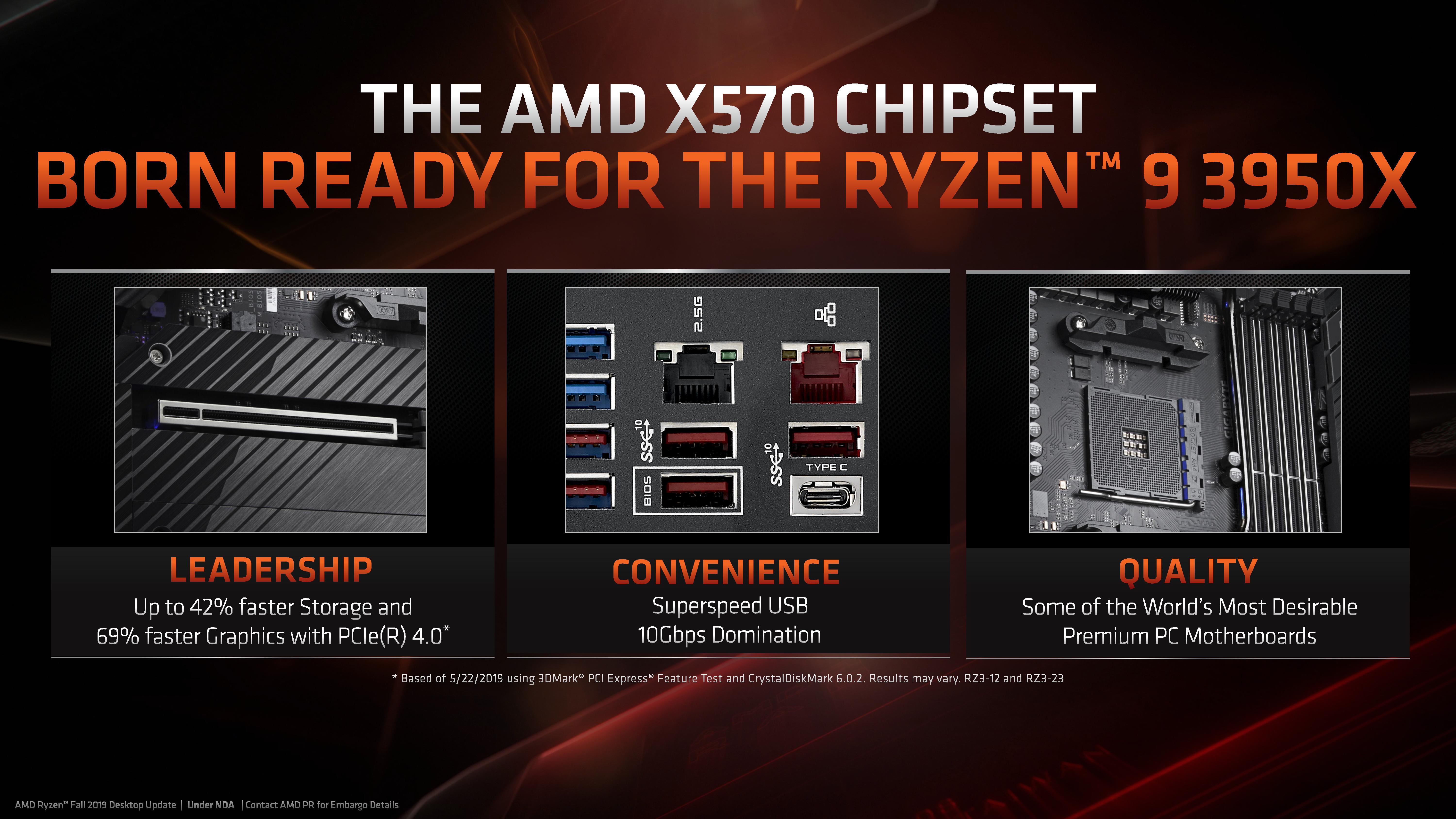
The 3950X drops into the standard AM4 socket on X570, X470, and B450 motherboards, though it would be wise to assure the motherboard has adequate power circuitry. AMD says that the Ryzen 9 3950X has only been validated for its new 1.0.0.4B AGESA, which motherboard vendors are rolling out for existing motherboards (via a firmware update) over the course of this month. AMD strongly recommends that all users migrate to the new motherboard firmware revisions.
The new firmwares include many of the fixes we've seen for AMD's boost clock algorithms, along with even more refinements that reportedly include faster boot times. This new BIOS also unifies all the Ryzen models under the same codebase, so there won't be any more split support for some older models.
AMD Ryzen 9 3950X Cooling Requirements
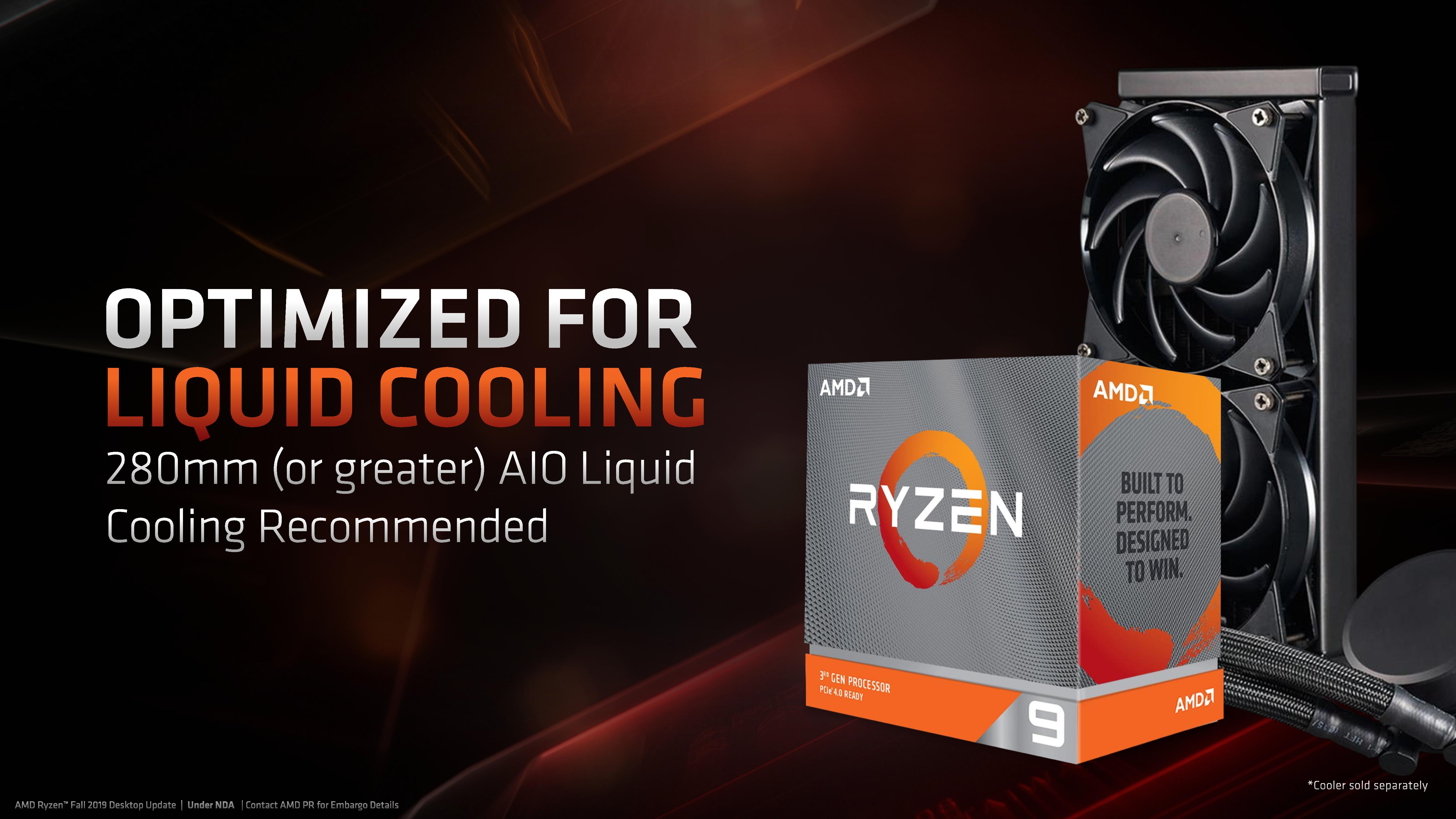
In a notable break from the Ryzen tradition, AMD isn't providing a bundled cooler for the Ryzen 9 3950X. AMD has sixteen 7nm cores and a 14nm I/O die operating under the same small heatspreader that debuted with the 8-core 14nm Ryzen models, so thermal density is a challenge even with the more efficient manufacturing process and soldered IHS.
AMD recommends a minimum of a closed-loop (AIO) 280mm watercooler for the 3950X, though representatives stated that a 240mm water cooler could suffice.
As we've seen with the existing Ryzen 3000 models, AMD's opportunistic Precision Boost Overdrive algorithms offer more performance with better cooling, in effect overclocking themselves. Naturally, better cooling will also yield better manual and auto-overclocking with AMD's Precision Boost Overdrive feature. That means that beefier AIO radiators and custom loops will be a nice addition to 3950X systems.
Power Consumption and New Eco-Mode Feature
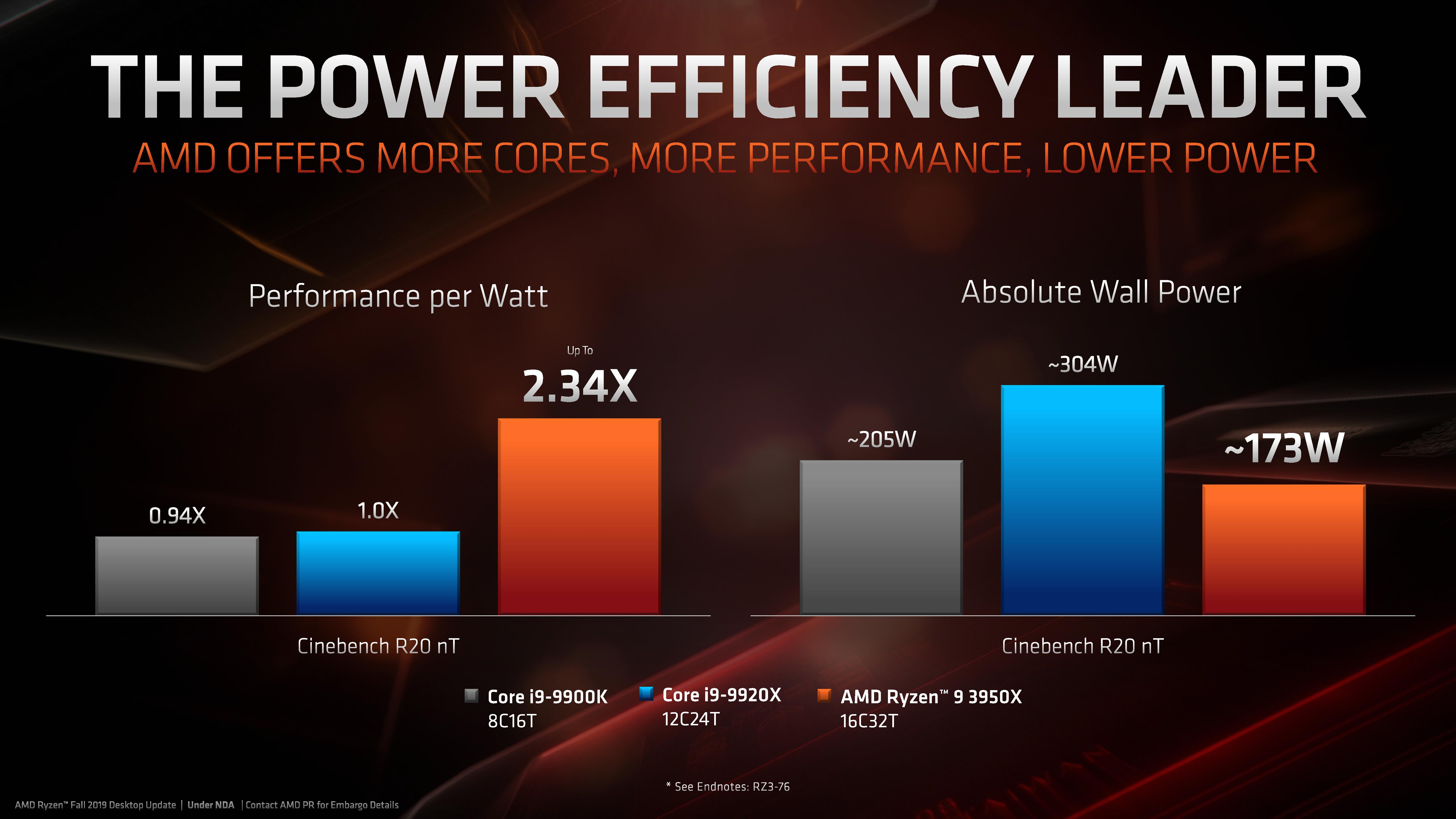
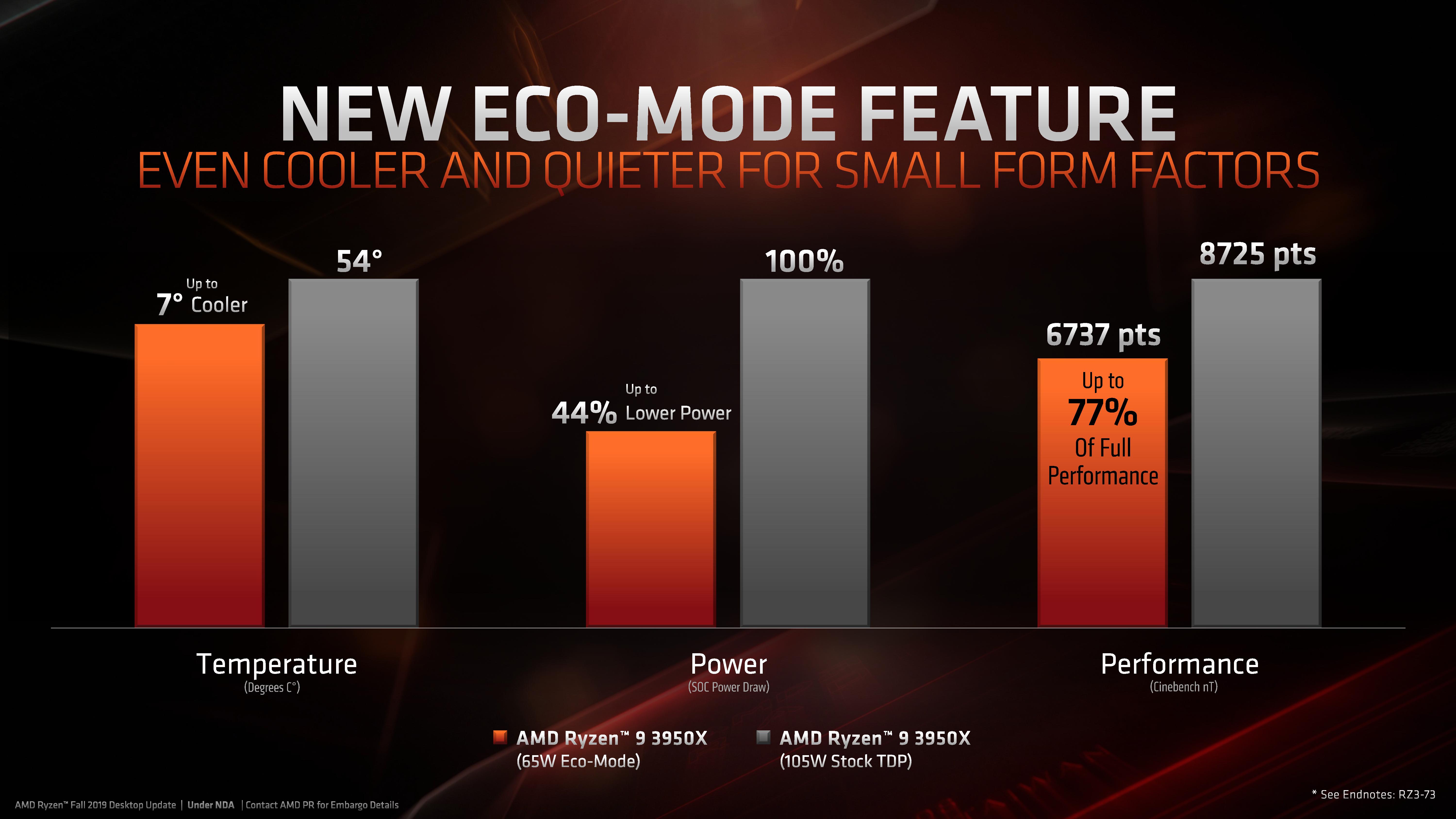
AMD rates the 3950X with a 105W TDP, but as we know from our extensive testing, this number doesn't equate directly to actual power consumption. The Ryzen 9 3900X consumes up to 140W during heavy workloads, and we can expect a commensurate increase in power consumption that scales with the 3950X's four additional cores.
However, the 7nm process enables incredible density and does afford power advantages, which AMD says equates to more than twice the performance-per-watt of Intel's Core i9-9900K and -9920X (measured at the wall). AMD also says a Ryzen 9 3950X system pulls 28W less than the Core i9-9900K. That's a notable claim because the -9900K has twice the number of cores. We'll be sure to put those power measurements to the test in our review.
If you're looking to cram an incredible amount of horsepower into a small form factor build, like a Plexbox or DIY NAS, AMD is also rolling out a new Eco-Mode feature. This feature allows the processor to downshift from its rated TDP to the next lower 'grade,' meaning you can drop a 105W processor to 65W, or a 65W processor to 45W. AMD is making this feature available on all Ryzen models, and after the requisite firmware update, you can make the adjustments in either the BIOS or Ryzen Master.
AMD claims the 65W mode on the 3950X offers 77% of the chip's full performance, but at a 44% power savings that results in a 7C reduction in temperatures. The easy-to-use feature should prove very handy for SFF enthusiasts, though making a few manual adjustments to the power thresholds would provide many of the same benefits.
AMD Ryzen 9 3950X Gaming and Application Performance
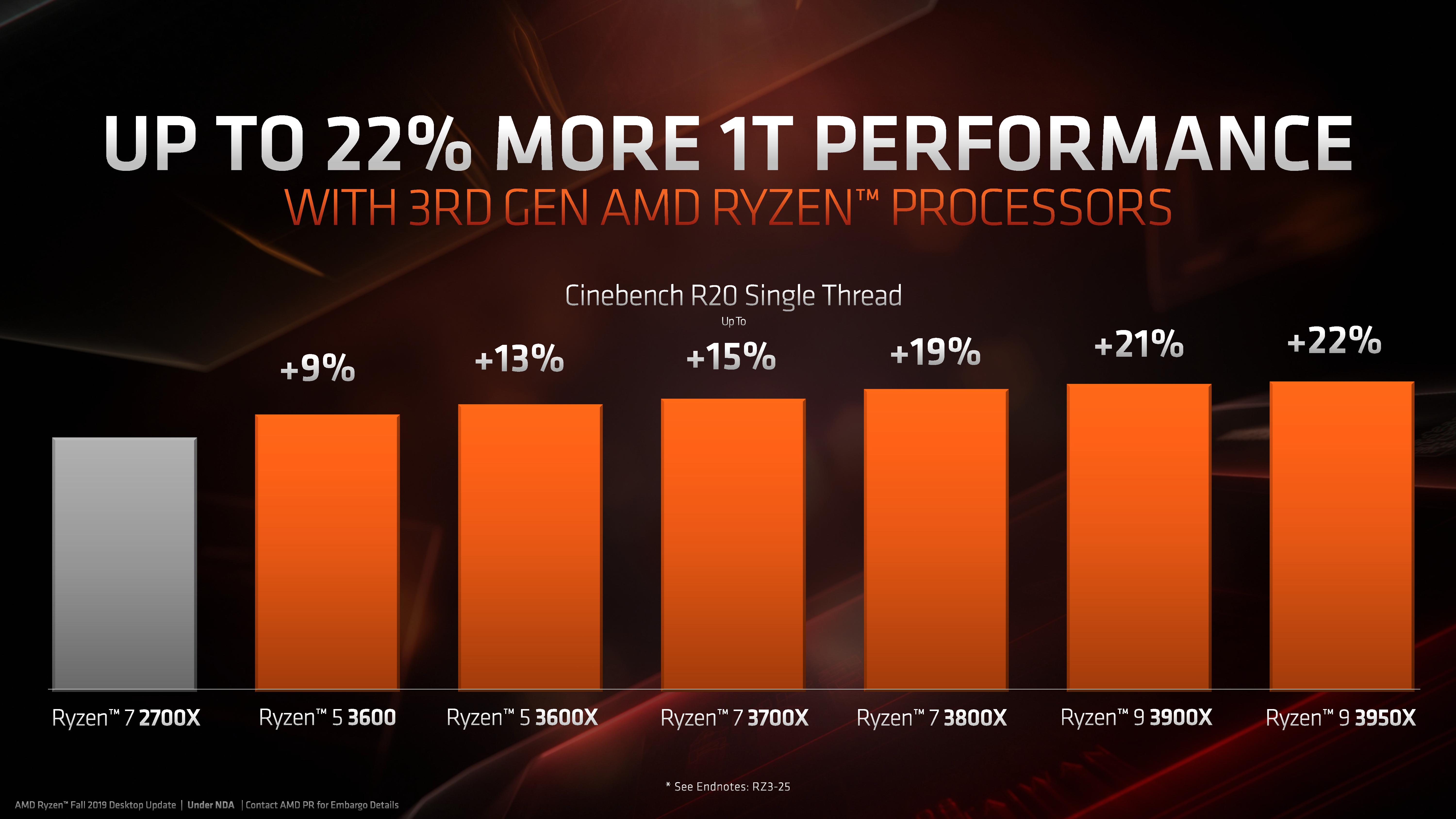
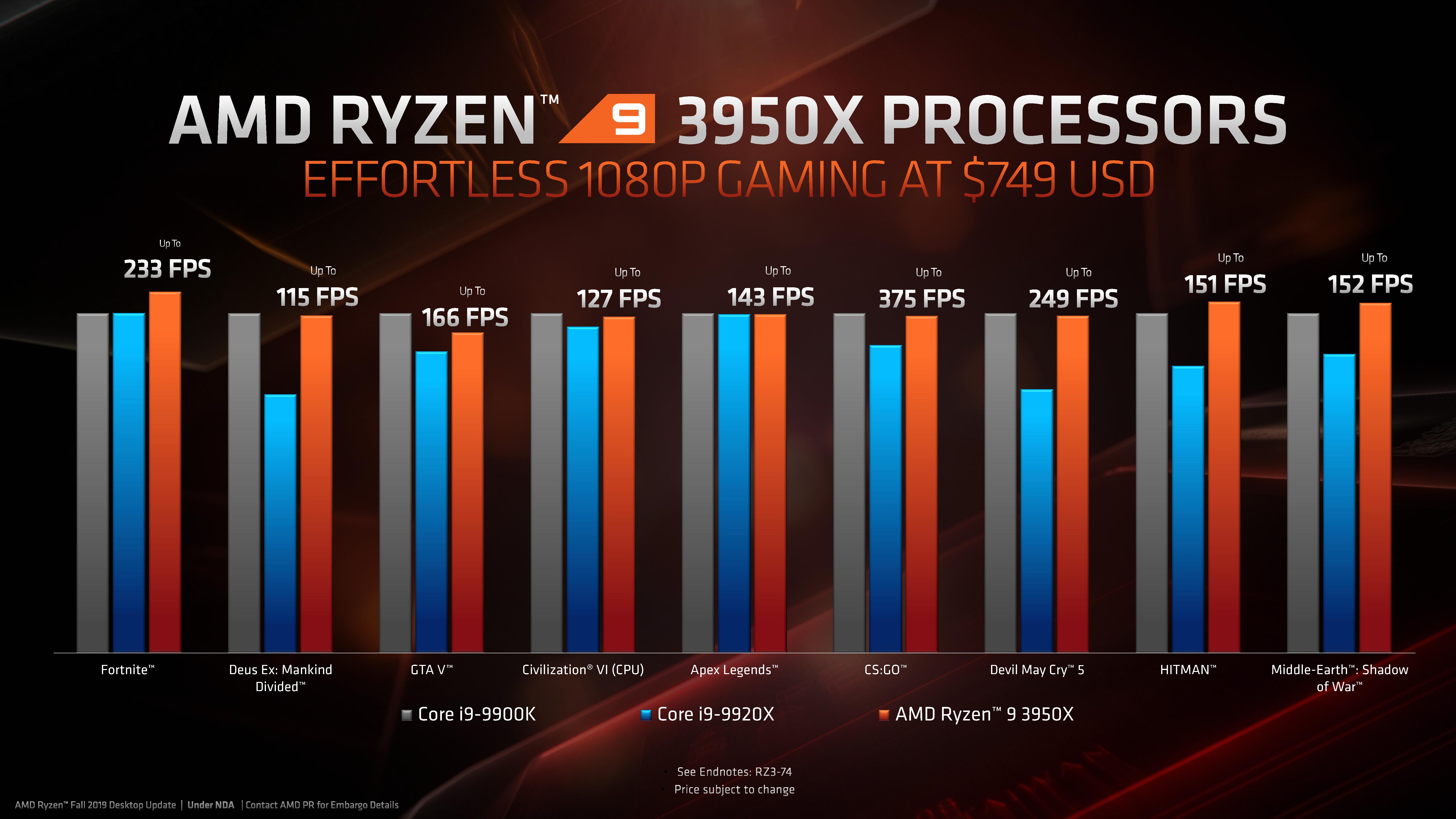
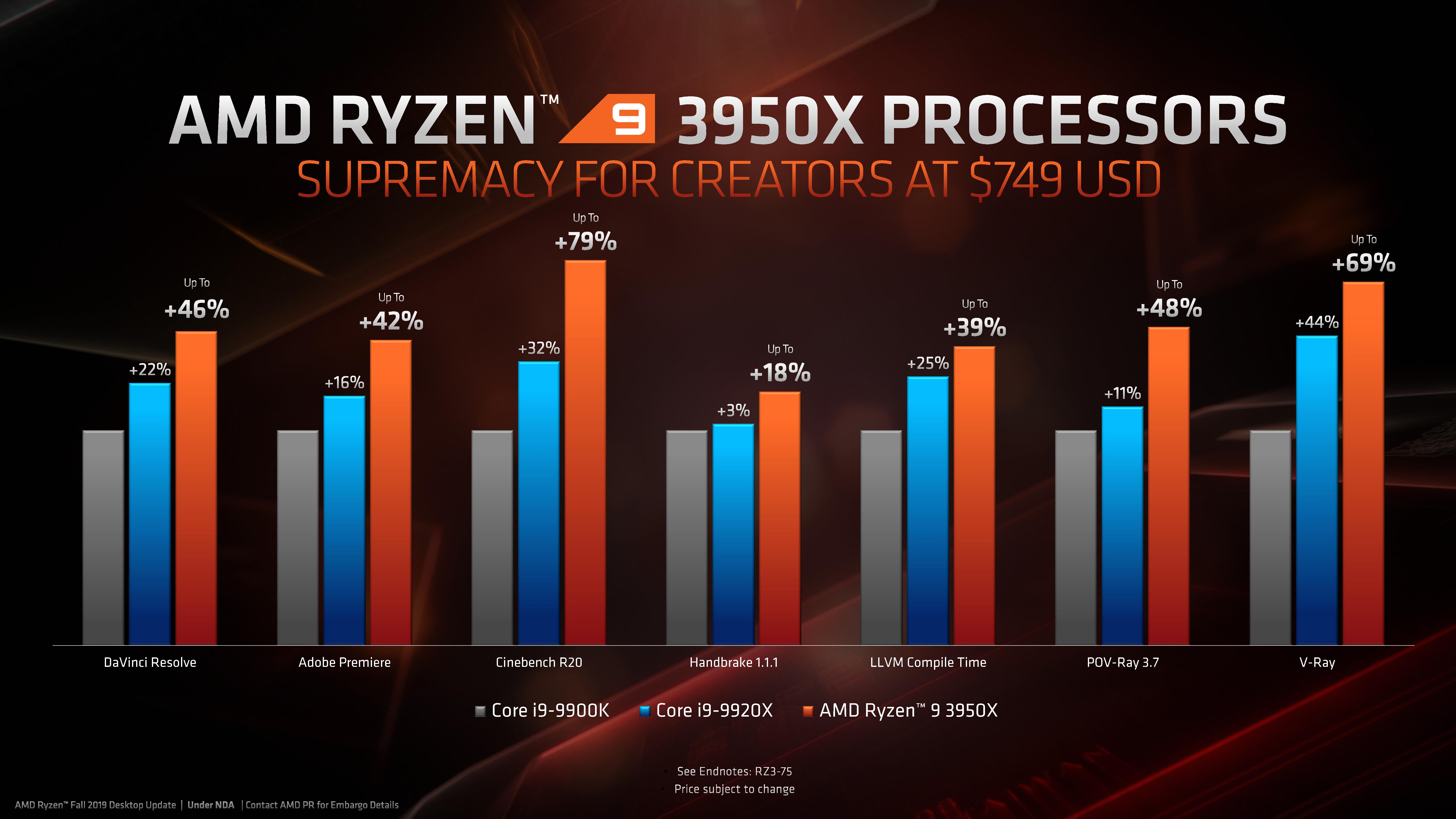
AMD shared several benchmark results, but as with all vendor-provided results, we should take these with a grain of salt.
AMD increased the 3950X's boost clock by 100 MHz over the 3900X, which equates to a slim 1% gain in single-threaded performance (as measured by Cinebench). The company also shared results that show the Ryzen 9 3950X providing comparable gaming performance to the Core i9-9900K in several game titles at the 1920x1080 resolution. However, you'll notice these are 'up to' frame rates, which means they are maximum values recorded with a GTX 2080, and not the average frame rate. That's misleading. [EDIT: AMD has confirmed that this in fact an average frame rate, and will provide further information to us about the conditions of the legalese tomorrow. As we know, AMD's Ryzen 3000 chips are more susceptible to performance variation (based on the chip you get) than other processors due to their mixture of faster and slower cores, with the latter not being a defined attribute. That could be the reason behind the 'up to' messaging. We'll update as necessary.]
The Ryzen 9 3950X really separates itself from the Intel comparables in AMD's application testing, which shows large gains over the Core i9-9900K and -9920X in a spate of heavily-threaded workloads.
Let's take a look at the new Threadripper announcements on the following page.
PAGE 1: AMD Unleashes the Cores
PAGE 2: Threadripper 3960X and 3970X, TRX40 Chipset, sTRX4 Socket
PAGE 3: AMD Athlon 3000G, Unlocking Overclocking on the Low End
Current page: AMD Unleashes the Cores
Next Page Threadripper 3960X and 3970X, TRX40 Chipset, sTRX4 Socket
Paul Alcorn is the Editor-in-Chief for Tom's Hardware US. He also writes news and reviews on CPUs, storage, and enterprise hardware.
-
jimmysmitty I can't wait to see some third party benchmarks and testing. I am interested in the 3950X mainly in the cooling requirements. I also want to see a more fair power assessment than one from a company. Who knows what exact setup they used to get power readings.Reply
New board for TR3, sucks for anyone on TR2 wanting to just CPU upgrade. I think its a good idea for AMD. Design the socket, chipset and CPU around each other for optimal performance gains.
Price also went up, logical since they sell well. AMD might as well make as much as they can.
But they will have to compete with CL-X which has the price cut in half and until we see reviews I would assume CL-X will still have a clock speed advantage.
Should be an interesting couple of weeks. -
NightHawkRMX Is it bad I am most interested in the 3000g, even though it shouldn't be that interesting since it is just a zen+ dual core with vega 3.Reply
But, since it is zen+ and unlocked, so I would love to see how far it will overclock. I want to see 4+ghz. -
NightHawkRMX Reply
Well, to be fair Intel will only give you 2 generations on a platform normally, so this is not badjimmysmitty said:New board for TR3, sucks for anyone on TR2 wanting to just CPU upgrade. I think its a good idea for AMD. Design the socket, chipset and CPU around each other for optimal performance gains. -
Exploding PSU "That's a notable claim because the -9900K has twice the amount of cores"Reply
I think you meant the 3950X here instead of the 9900K. Small mistake, I know, but I got a little bit confused reading that part.. -
kinggremlin ReplyAMD provided a few benchmarks that show the Threadripper processors handily dispatching the $1,999 Core i9-9980XE in a series of heavily-threaded benchmarks,
The formerly $1,999 i9-9980XE. It sells for well below that now.
Newegg -$1090At $1000, the i9-10980XE will be priced quite competitively vs these new Threadripper CPU's. -
mdd1963 ReplyNightHawkRMX said:Is it bad I am most interested in the 3000g, even though it shouldn't be that interesting since it is just a zen+ dual core with vega 3.
But, since it is zen+ and unlocked, so I would love to see how far it will overclock. I want to see 4+ghz.
Zero use for 2c/4t systems for use with any games whatsoever....
I read this is a die-shrink of the 200G, with a 100 MHz boost in clock speed...
There might be a market for some bargain basement, 'we need a bunch of complete $299 systems with 4 GB of RAM and $50 CPUs ASAP', but, I'm not sure that's a market I'd be searching for, as it sounds more like WalMart's realm/area of specialty...(or maybe Dell with a complete system at $199) -
Darkbreeze Actually, that CPU would make a perfectly fine little HTPC. You don't need more than 2/4 for a box that's going to do nothing more than serve up music and movies from some small form factor brick.Reply -
jimmysmitty ReplyNightHawkRMX said:Well, to be fair Intel will only give you 2 generations on a platform normally, so this is not bad
Yea. I said I think its a good thing. I don't think trying to keep CPUs and old boards compatible is the best way to go. Give it 2 or 3 gens then move on to reap overall system improvements. Could you imagine if people were able to throw a Ryzne 3 CPU into a 990FX board? I mean moneys worth on the board but thats what some people actually want.
Darkbreeze said:Actually, that CPU would make a perfectly fine little HTPC. You don't need more than 2/4 for a box that's going to do nothing more than serve up music and movies from some small form factor brick.
I would have to test it TBH. My HTPC has a, be it older, quad core AMD CPU (one of the old Athlon 4 core mini boards, and the CPU is a big drag. I also had to recently upgrade the GPU and went nVidia because none of the low profile AMD GPUs supported x265 10bit HEVC encoded videos. But a cheap GT 1030 does so yay. -
logainofhades As there was a version, for TR4 motherboard mounting, and it was able to handle those CPU's, I am sure the be quiet! Dark Rock Pro 4 would handle a 3950x, just fine, for those not wanting an AIO.Reply -
Soaptrail Paul has a correction to make:Reply
However, the 7nm process enables incredible density and does afford power advantages, which AMD says equates to more than twice the performance-per-watt of Intel's Core i9-9900K and -9920X (measured at the wall). AMD also says a Ryzen 9 3950X system pulls 28W less than the Core i9-9900K. That's a notable claim because the -9900K has twice the number of cores. We'll be sure to put those power measurements to the test in our review.
Should be the 3950X has twice the cores.